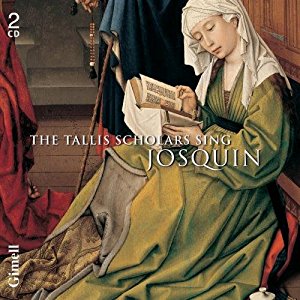 Josqin des Pres (1450?-1521) was born Josqin Lebloitte, either in Hainault (modern Belgium) or in France. (The “des Pres” was a nickname, as they understood such things in the fifteenth century.) He seems to have been a choirboy at Saint-Quentin from around 1460, where he may have studied with the renowned composer Ockeghem.
Josqin des Pres (1450?-1521) was born Josqin Lebloitte, either in Hainault (modern Belgium) or in France. (The “des Pres” was a nickname, as they understood such things in the fifteenth century.) He seems to have been a choirboy at Saint-Quentin from around 1460, where he may have studied with the renowned composer Ockeghem.
By the time we know anything definite about Josquin, he was a singer in the employ of René, Duke of Anjou. He also served in the papal choir in the reign of Innocent VIII; in France, probably in the service of Louis XII; and then in Ferrara. He spent the last twenty years of his life in his native Condé, on the French-Belgian border.
In spite of the dearth of records concerning his life, we do know that Josqin was the foremost composer of his time. Although his music was largely overshadowed by that of Palestrina and Tallis for literally centuries, Josquin has, over the past hundred years or so, been rediscovered. Both Tallis and Palestrina wrote engaging and often quite beautiful choral music but by comparison, Josquin’s masses, motets and chansons are, as Peter Philips notes in his commentary on this collection, “complex, intellectually and vocally, posing problems which have only recently been found to represent a supreme challenge.” Or, more succinctly, “Josquin didn’t write any simple music.”
One thing that has kept Josquin from being more widely performed until more recently is the technical difficulty of his writing. It’s not something that a casual listener will necessarily be aware of (unless the casual listener is very sophisticated about vocal technique), but when one begins to pay close attention — and the music not only deserves that, it demands it — one is struck, possibly even awestruck, by what the singers are actually doing. As Philips notes, the music demands a “lightness of touch” and full control over two octaves. The style, in spite of the full sound, is really quite lean, displaying a remarkable economy of means (one of my favorite things in any form of art, what a scientist would call an “elegant solution”) in achieving a richly textured but ethereal result.
One thing I’ve found characteristic of the music of the middle ages, at least the sacred music, is that it reaches toward heaven, if only metaphorically: I have a mental image of the choirmaster of standing there saying “OK, people — we’re all going to be angels here. Let’s make it sound like it.” (I will admit that the secular music of the period often has quite a different emphasis.) With their performance of the music of Josquin, the Tallis Scholars deliver. I find it incredible that this sound is coming from about a dozen singers singing a capella.
I’m not talking about a wall of sound here. For that, go to Berlioz or Wagner (or Led Zeppelin, or Foreigner, or. . . .) Think of it more as an intensity of expression, total focus on a sound delivered without apparent effort. (The “apparent” is the tricky part, as anyone who has ever studied in a complex and demanding discipline, especially one that makes you sweat, will know.) The sound, like the style, is somewhat spare, but it’s the spareness of an object made to the most sophisticated design out of the finest materials: it doesn’t need a lot of frou-frous.
Is it worth listening to? My answer presupposes a fondness for early European music, or at least a willingness to be exposed. It may help to note that two of the performances presented on this dual-disc set, the Missa Pange lingua and the Missa La sol fa re mi, won the Gramophone Record of the Year Award in 1987. Not the “Classical Record of the Year” — the Record of the Year. So, yes, I think it would be worth your while, to be much too laconic about it.
The singers in this recording include: Paul Agnew, Tessa Bonner, Stephen Charlesworth, Charles Daniels, Simon Davies, Sally Dunkley, Richard Edgar-Wilson, Donald Greig, Robert Harre-Jones, Adrian Hill, Michael Lees, Rufus Müaut;ller, Mark Padmore, Deborah Roberts, Nicholas Robertson, Ashley Stafford, Francis Steele, Julian Walker and Timothy Wilson; Peter Philips, dir.
(Gimell Records, 2006)
